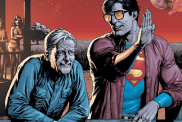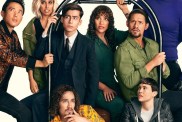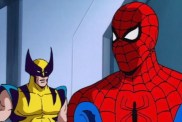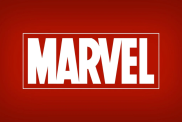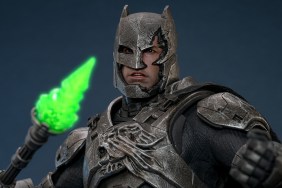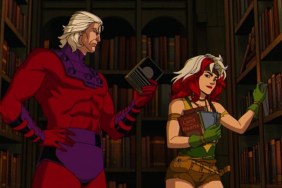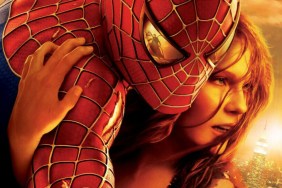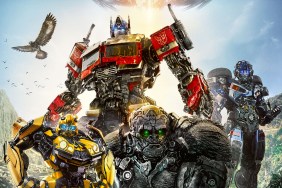
Regular readers of Superhero Hype! may think they have a pretty good handle on the world of comic book movies, but for all the Tim Burtons, Bryan Singers, Sam Raimis and Christoper Nolans behind the lens, there’s always someone behind the scenes who has to convince the studios to make the movies in the first place. Nowadays, it’s not that hard, since you just have to point to the success of Spider-Man to show that moviegoers thrive on superheroes.
Twenty years ago, it wasn’t so easy.
Even before Warner Brothers found success with Richard Donner’s Superman in 1978, Michael Uslan was struggling to get people in Hollywood to take comic books seriously, and twenty years since he dedicated his life to bringing Batman to the big screen, he’s delighted to see that the character has been revived and done right in the recent Batman Begins.
Between co-producing the Constantine movie with former Warner Bros. VP Lorenzo Di Bonaventura and being linked to movies based on Swamp Thing, Captain Marvel (AKA Shazam!) and Will Eisner’s venerable hero The Spirit, Uslan might very well be considered the Godfather of comic book and superhero movies.
Last month at Comic-Con International, Superhero Hype! sat down with Michael Uslan for a pleasant chat about how Batman and other comic book characters went from being “kid’s stuff” to becoming big screen icons that earn literally billions of dollars.
But first, a little bit of background: Uslan has lived his entire life in New Jersey, having been born in Bayonne, but his first real foray into the world of comics occurred when he and his friends would commute into New York City to take the weekly tour of the DC Comics offices during the early ’60s. There, he would meet Sol Harrison, the future president of DC Comics, who would play a pivotal role in Uslan fulfilling many lifelong dreams. In college, Uslan taught a course in Indiana about comic books, which got him international media attention. His long-time friend Sol Harrison got back in touch with him, and before he knew it, he was working at DC Comics. After writing a last-minute fill-in story for “The Shadow,” he was given the assignment of his dreams, to write the Batman comic book. This is where we begin the first part of our exclusive interview, in which Uslan talks about his early involvement with Batman and struggling to get the character into movie theatres.

SHH!: Is it safe to say that you’ve always been a Batman fan?
Uslan: When I was 8 years old, my dream was to write Batman comics. I always identified with Batman strongly. He had no superpowers, which I felt was really the coolest thing of all, and had the greatest super-villains, which was the other magic piece for me. I always thought in my head that if I studied and worked out real hard and if my dad bought me a cool car, I can do what this guy does. There was a fanzine that came out that was called Batmania, and I was one of the original charter subscribers back in the year zero when comic book fandom was just emerging.
SHH!: It’s a bit of a stretch from being a comic book fan and writer to being a lawyer and movie producer. How did you make that transition?
Uslan: So all of a sudden, I’m back at Indiana writing Batman, and it was an epiphany. This dream that I had since I was 8 years old had come true. Now what am I going to do next? At that moment, I said “I want to produce a definitive Batman movie.” A dark serious movie, just the way Bob Kane and Bill Finger created him in 1939. Creature of the night, stalking criminals from the shadows. That then became my goal in life. Sol [Harrison] told me that “Batman is as dead as a dodo since it went off the air. Nobody’s been interested in Batman.” He advised me to get the proper credentials, so I went to law school and spent years learning about every aspect of how to finance and produce films by working at United Artists, the only movie studio based in New York at the time. [Sol] had mentored me and was a father figure to me in the business, so I knew that if there was any activity, he would let me know. I totally trusted him. His name has not really come out in any articles about how integral he was to this whole Batman movie thing getting started, and he deserves this credit.
SHH!: Once you got the necessary credentials and experience, how did you go about trying to acquire the rights for the character?
Uslan: I went to Ben Mellnicker, a legend in the business in his heyday, running MGM Studios for about thirty years. He was a tough negotiator, known as the MGM lion by all the lawyers in the business. It took us six months to negotiate the deal and then we had to raise a lot of money quickly, which we did privately. On October 3, 1979, we formed BatFilm Productions, we acquired the rights to Batman, and I put it in my pocket and I quit, because I was absolutely sure everyone would line up for it. I would go out and say that it was a presold property, known worldwide to multiple generations. There could be sequels and animation and toys and games. I was turned down by every single studio in Hollywood. I still have the Telex from Warner Brothers, who had the right to first refusal. They didn’t even want to hear my pitch. I was told by everyone I was crazy to do a serious, dark comic book movie.

SHH!: Had Warner Brothers already bought DC Comics at that point in time?
Uslan: In all honesty, the viewpoint of a lot of people at Warners at that moment was that they really looked down their nose at DC Comics. They thought it was cheap kids’ entertainment. They really weren’t thrilled, at that moment, to have a comic book company, even with the “Superman” movie. It was different times.
SHH!: Did Warner Brothers and the other studios even understand the potential appeal for a comic book movie?
Uslan: They saw it as based on the television show, and they said if you want to do a Batman movie, we’ll do it, but it’s gotta be the funny, pot-bellied guy with the Pows, Zaps, and Whams because that’s all audiences will remember and love. I said “No way. You’re not going to touch this if you’re not agreeing to this vision.” I had to fight tooth and nail at every turn to make them understand that the underlying property was the comic books and that they weren’t campy or silly. That was a battle. I was very careful to not show them the comics from the ’60s. In my first three meetings with Tim Burton, it was my responsibility to introduce him to Batman and provide him with the material. I only let Tim see the original year of the Bob Kane/Bill Finger run, up until the time that Robin was introduced. I only let them see the Steve Englehart/Marshall Rogers and the Neal Adams/Denny O’Neil runs. Those three things were the only thing that I exposed them to, because it was just as important as to what they were not looking at.
SHH!: I’m sure you must have gotten some interesting rejectins during that time. What was the worst?
Uslan:At Columbia, they said “Michael, you’re crazy. Batman will not be a successful movies because our movie Annie did not do well.” And I said “What does that have to do with Batman?” That was the thinking that I had to fight. It’s been years and years, the better part of my career, battling the thinking of Hollywood over doing comic book movies without camp, and doing them dark and serious.
SHH!: Around that same time, you produced the ’80s Swamp Thing movie and its sequel, right? How did that come about?
Uslan: After we acquired the rights to Batman and were being turned down everywhere, we knew that it would be a little while before we could get it going, and we were looking for something quick and cheap to get it going in the meantime, so everyone wouldn’t starve.
SHH!: Will you be involved with the new Swamp Thing movie that Joel Silver has mentioned wanting to do?
Uslan: It’s a tremendous character, and I would love to see it done right with actual money behind it. That’s something that the character has never had. There’s never been money behind the productions. It’s a cult favorite, and I think that there’s an opportunity to mine it and treat it the right way on the right and proper size.

SHH!: Getting back to Batman, can you talk about the idea for getting Jack Nicholson to play the Joker?
Uslan: I sat down and did a 17-page creative blueprint for doing a dark, serious nature, including one line on the memo that Jack Nicholson was the only guy that could play the Joker. That became our document for getting this done. Part of the presentation was the “Here’s Johnny” picture of Jack from “The Shining”, since that was opening up, too. I took it out of the newspaper, and took White Out and put it on his face, and took a red pen and put it on his lips and a green magic marker for his hair (see bigger picture here). That’s what I started showing everyone to make them understand how we would approach this movie.
SHH!: For the sake of time, we’ll skip over the Batman sequels, but who’s decision was it to start from scratch and do something different after all the time that passed since “Batman & Robin”?
Uslan: I think the simplest and best way to say it is that thank God everyone wound up on the same page. The management at Warners has been spectacular in committing itself to correcting the course, seeing the movie done in a character-driven, plot intensive way, not swamped by CGI. You’re dealing with a guy whose greatest superpower is his humanity, not because he can fly or do anything else. Paul Levitz and D.C. Comics pushing every step of the way. Chris Nolan coming in with the vision to execute. David Goyer coming out of comic books as a popular and noted writer and lover of the material and the characters. It was like all the stars aligning from every quarter of what goes into a movie and when something like that happens, which I’m not sure if it’s ever happened before quite like that—maybe on “Spider-Man” it did—it’s pure magic.
SHH!: I imagine that you’re quite happy with how the latest film turned out?
Uslan: “Batman Begins” has elevated the comic book movie to a new plateau. The difference is that people are not saying it’s a great comic book movie, they’re saying it’s a great film. People who do not go to comic book movies are loving it, because it’s got plot, it’s got character development. It’s plausible. And thank God, Batman is the most interesting character in the movie, because we have villains who are understated instead of over-the-top. All the credit in the world goes to my movie God Chris Nolan. For a movie that I desperately wanted to see as the second movie of the series, then having to wait thirteen years, it was absolutely worth the wait. It’s been a battle that I’ve been fighting so long. As I said to my kids when we saw the final cut, with “Batman” and “Batman Begins”, if I retire tomorrow, I will have accomplished all of my career goals.

SHH!: So what happens now as far as the Batman franchise? [Note: Minor Spoiler Warning for “Batman Begins”]
Uslan: I think at this point everyone takes a deep breath and goes on vacation, and then everyone comes back and talks. When you see the movie and when Commissioner Gordon turns over the Joker card, they all cheer.
SHH!: Considering the bad taste left on many people’s mouths by the “Catwoman” movie, do you think you’ll ever be able to bring her back into the Batman universe?
Uslan: Just keep in mind that “Batman Begins” is a reboot. That’s the operative word. Whether it’s the Batman, Joker, Two-Face. Whatever comes is a complete reboot.
Click here for Part 2, in which Michael Uslan talks about Constantine, some of his other upcoming projects, as well as the state of comic book movies today.
Source: Edward Douglas

